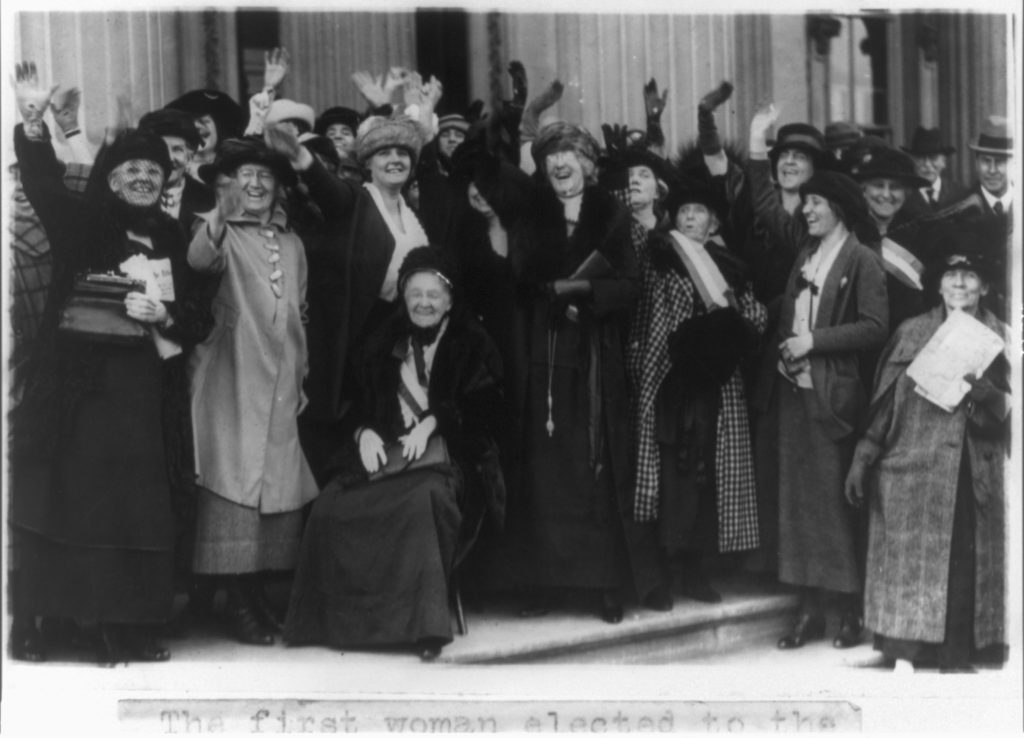During the 2019-2020 Georgia History Festival, members of the Georgia Historical Society Affiliate Chapter Program will explore the legacy of women’s suffrage in their community through submitted blog posts. Using existing historical markers as the basis or inspiration for these posts, contributors will explore how local women have influenced political, civic, and cultural life through the suffrage or anti-suffrage movement, voting, civic action, and literary or artistic pursuits. The posts will explore both the struggle for women’s suffrage and the legacy of that struggle throughout the twentieth century and examine how these women affected change, both locally and nationally, even when they did not have the right to vote. This month Bartow History Center’s Trey Gaines explores the Felton Home and Rebecca Latimer Felton historical markers, and the role of women in local and national politics.
“When the women of the country come in and sit with you, though there may be but a very few in the next few years, I pledge you that you will get ability, you will get integrity of purpose, you will get exalted patriotism, and you will get unstinted usefulness.”
These words were spoken by Senator Rebecca Latimer Felton on the floor of the US Senate on November 22, 1922, where, the day before, she had just been sworn in as the first female senator, filling the seat opened at the death of Senator Tom Watson. While her appointment was meant only to be temporary, was politically motivated, and only lasted a day, it nevertheless served as the pinnacle of a lifetime of determination and service.
Rebecca Felton, born in 1835 in Decatur, moved to Cartersville, Cass (now Bartow) County, Georgia, after marrying Dr. William H. Felton in 1853. The two had met a year prior at her graduation from Madison Female College, where he delivered an address at commencement. After a quick courtship, they married and moved to the Felton family farm.
Following the Civil War, William and Rebecca opened Felton Academy in early 1866, filling a need in north Georgia for schools following the war. They also had two more sons, in addition to two sons and a daughter. Only one of her children survived to adulthood.

It was during the 1870s that Rebecca’s prominence began to soar. William re-entered politics, serving in the US House of Representatives from 1874 to 1880 and the Georgia state legislature from 1884 to the early 1890s. Throughout his campaigns and terms in office, Rebecca served as his press secretary, counselor, campaign manager, private secretary, and tireless supporter. She wrote letters, made appointments, answered attacks, ensured printing and distribution of materials, and much more. Rebecca became known as “the most politically informed Congressman’s wife from the South.”
During her husband’s political career and after his death in 1909, Rebecca championed her own causes including education reform, opposition to the convict leasing system, and women’s rights–including suffrage. It was also her well-established reputation that gave her a platform from which she could express her controversial views on race. Extreme even for some in the Jim Crow South, Felton fervently supported the lynching of black men as a deterrent to a perceived threat to white women during an inflammatory 1897 speech to the Georgia State Agriculture Society.
Despite her virulent racial rhetoric, Felton’s prominence continued to grow. In 1900, Rebecca began writing for the Atlanta Journal. Her column covered a wide range of topics from taxes, politics, women’s issues, and more. She would go on to write her column for decades. Throughout the early 20th century, she held prominent roles in the struggle for women’s rights, including positions in the Chicago, Atlanta, and St. Louis Expositions; a trustee of the Georgia Training School for Girls; a member of the Woman’s Christian Temperance Union; and a vocal opponent to the State of Georgia’s stance against the Nineteenth Amendment, granting women the right to vote.
Rebecca Latimer Felton died on January 24, 1930, and was buried in Cartersville’s Oak Hill Cemetery. At her passing, Atlanta mayor Isaac Ragsdale stated, “In the death of Mrs. Rebecca Felton the state of Georgia has lost one of her leading citizens. She was one of the most dominant figures of leadership and progress that the state has ever produced.”
